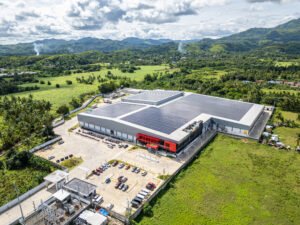Thursday, 29 January 2026
Harnessing Quantum AI for Greener Minds and Healthier Futures
Professor Rajib Rana, University of Southern Queensland As climate change and mental health challenges increasingly affect young generations, the intersection of technology, sustainability, and education has never been more critical.…

Professor Rajib Rana, University of Southern Queensland
As climate change and mental health challenges increasingly affect young generations, the intersection of technology, sustainability, and education has never been more critical. The University of Southern Queensland (UniSQ), in collaboration with Food Ladder and CSIRO, is pioneering a groundbreaking initiative that integrates quantum artificial intelligence with school-based greenhouse programs. Led by Professor Rajib Rana, the project explores how advanced AI systems can measure and enhance the therapeutic and educational benefits of student interaction with plants, from boosting focus and resilience to deepening environmental awareness. In this conversation with NUFFOODS Spectrum, Professor Rana discusses the motivation behind the partnership, the science driving their research, and how quantum AI could redefine the future of student well-being and food security in schools.
What motivated UniSQ to partner with Food Ladder and CSIRO on applying quantum AI in school-based greenhouse programs, and how does this align with your research priorities?
UniSQ partnered with Food Ladder and CSIRO to explore a pioneering application of quantum artificial intelligence that brings together food security, sustainability, and student well-being. Food Ladder’s school-based hydroponic greenhouses offer an ideal environment in which technology, education, and community engagement can work hand in hand. CSIRO’s expertise in quantum systems complements UniSQ’s strengths in artificial intelligence for health and social impact, creating a partnership well-positioned to deliver measurable and meaningful outcomes.
This initiative aligns closely with UniSQ’s research priorities in AI, sustainability, and regional development. It also builds upon the university’s recent investment in a new $3.5 million Quantum Facility at Springfield, designed to translate advanced quantum research into practical innovation across agriculture, health, and education.
As the lead on researching the therapeutic benefits of student interaction with plants, how will you measure and quantify mental health outcomes such as calm, focus, and resilience?
We are combining biometric data collection with behavioural analysis to understand how working with plants can influence students’ emotional well-being. Research show that access to high-quality green spaces is consistently associated with improved mental health and wellbeing—especially for children and adolescents—through benefits like stress reduction, enhanced attention, and opportunities for social connection.
Students involved in greenhouse activities will wear Fitbit-style sensors that record heart-rate variability, sleep patterns, and physical activity, proxies for calmness, focus, and resilience. These data will be analysed using artificial intelligence and quantum-enhanced pattern recognition to identify links between plant-care activities and mental health indicators. Alongside this, qualitative focus groups and reflective journals will capture students’ sense of connection, mindfulness, and agency, ensuring that both quantitative and experiential aspects are represented.
How will the integration of advanced AI technologies, including quantum machine learning, enhance your ability to analyse and optimise student well-being outcomes?
While traditional AI techniques are effective at pattern recognition, quantum machine learning allows us to explore the complex, multidimensional relationships that often exist in small and varied datasets typical of educational and behavioural research. Quantum algorithms can reveal subtle, non-linear links between physiological responses, environmental conditions, and emotional states. This methodology captures the multi-dimensional and dynamic nature of mental health and learning – allowing for more precision understanding of the impacts of green spaces, and nature-based curriculums – on children.
Working with CSIRO’s Quantum Systems Group and using UniSQ’s new He₃ quantum hardware, we will develop and test quantum-enhanced optimisation models that can adapt to individual learning environments and provide more refined feedback for teachers and students.
What challenges do you anticipate in applying quantum AI to a real-world educational environment, and how does UniSQ plan to address them?
Introducing quantum AI into schools presents several challenges, particularly regarding data privacy, ethical oversight, and system scalability. Technologies used with children must be safe, transparent, trustworthy, and directly relevant to educational practice.
To address these concerns, we are implementing ethical AI frameworks aligned with Australian privacy and child-safety standards, conducting co-design workshops with teachers to ensure educational value, and adopting a stepwise approach that validates classical AI models before transitioning to quantum prototypes. The intent is not to replace educators, but to enhance their capabilities. This progression allows us to ensure both technical reliability and user confidence.
How do you envision the insights gained from this research influencing the design and implementation of future school-based programs for student well-being and food security?
The changing climate affects access to nutritious food and quality green spaces, with significant consequences for children’s health and learning. The project aims to establish a scalable, evidence-based framework that integrates food production, environmental education, and emotional well-being. The findings will guide the development of curricula linking STEM and sustainability education, create AI-based tools for monitoring engagement and greenhouse performance, and inform policy frameworks supporting national school food and well-being programmes.
Over time, these insights could contribute to Australia’s National Sustainability Curriculum, embedding well-being and environmental awareness as measurable learning outcomes for young people.
Looking ahead, what potential do you see for combining AI-driven data analysis with experiential learning in schools to create healthier, more resilient student communities?
The combination of data-driven insight and hands-on experience has immense potential to transform learning environments. When students care for plants and manage hydroponic systems, they engage not only with science and technology but also with patience, empathy, and self-regulation.
Quantum AI offers an opportunity to personalise these experiences in real time, adapting to each student’s engagement and emotional state. In doing so, we hope to foster school communities that are healthier, more resilient, and deeply connected to both the environment and their own well-being.
Shraddha Warde
shraddha.warde@mmactive.com
Technology
Capel Marron Farm boosts Australia’s premium food investment credentials
Jan 28, 2026 | Australia
Tetra Pak invests €60Mn in owned pilot plant to advance paper-based barrier technology development
Jan 27, 2026 | Company News
Jollibee Group inaugurates VisMin Commissary in Philippines to support regional expansion
Jan 22, 2026 | Company News
Food Testing
NSF launches retail food safety audit program in ASEAN and Australia
Jan 19, 2026 | Australia
Bringing PFAS testing to the point of need
Jan 16, 2026 | Australia
IMCD opens a Food & Nutrition Laboratory in Cologne
Jan 08, 2026 | Company News
More Popular
UAE’s Al Ain Farms plans to raise egg production to 550 million annually
Jan 29, 2026 | Company News
Japan’s Tabimori launches authentic Omakase sushi course for vegetarians and vegans
Jan 29, 2026 | Company News
Bacardi and CCEP join forces to elevate premium spirits in New Zealand
Jan 29, 2026 | Beverages






